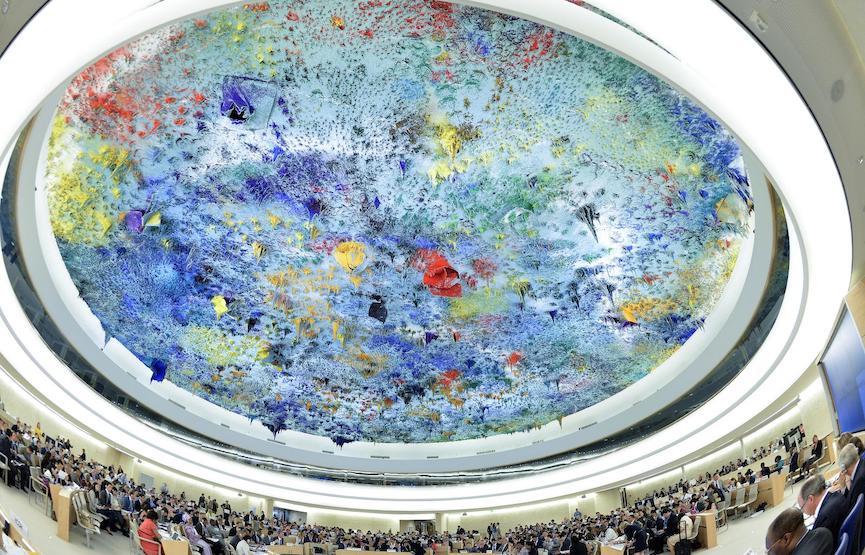Peace Brigades International’s Mexico Project has posted a statement in support of The Binding Treaty on Business and Human Rights, arguing it could improve social conditions and provide greater protection for human rights defenders.
In 2014, the United Nations Human Rights Council passed Resolution 26/9 that established an “intergovernmental working group on transnational corporations and other business enterprises with respect to human rights.” In 2018, the working group issued a a “zero draft”, or a first official draft, of a legally binding instrument to regulate the activities of transnational corporations. The 4th session of the working group reviewed the zero draft in October 2018.
Lexology now comments, “This year, we will see the draft of the convention start to take shape.” That article adds, “States and other stakeholders have been invited to submit their comments on a ‘zero draft’ of the convention by the end of February 2019.” The revised draft of the proposed treaty is scheduled for release in June 2019. A 5th session of the working group is scheduled to take place in October in Geneva for further discussion on this treaty.
PBI Mexico states, “The past few years have seen a spike in attacks against land, territory and environmental defenders. […] These defenders are directly impacted by the lack of regulation of the international business sector and the imbalance between corporate power and the weak human rights protection mechanisms implemented by governments across the world.”
PBI Mexico argues that the Treaty on Business and Human Rights should include provisions on:
- The prevention of attacks against those defending their land against the threat of large-scale international investment
- The protection of the rights of communities and individuals over the profit margins of companies
- Environmental and human rights assessments to ensure minimal damage in the implementation of economic projects
PBI Mexico comments, “The privileged position given to international investment in countries such as Mexico has resulted in the structural reforms that aim to attract this foreign capital to the detriment of the rights of communities to a clean environment and to be included in decisions around investments in their territories.”
NOW Magazine reported that, “Of the 293 mining companies operating in Mexico, 205 are backed by Canadian capital.” The Globe and Mail recently reported, “Most of us don’t associate Canadian businesses with assault and murder. But between 2000 and 2015, 44 people died as a result of violence surrounding Canadian-owned mines in Latin America.”
PBI Mexico also notes, “This [privileged position for foreign capital] can also be seen in the investment protection clauses in Free Trade Agreements.” This would arguably include the United States-Mexico-Canada Agreement (USMCA) reached in October 2018 by U.S. President Donald Trump, Canadian Prime Minister Justin Trudeau, and then-Mexican President Enrique Peña Nieto.
That deal is intended to replace the North American Free Trade Agreement (NAFTA) that includes a Chapter 11 investor-state dispute settlement (ISDS) mechanism that allows transnational corporations to sue governments in secretive tribunals most commonly over environmental protection measures and seek compensation for future profits impacted by public interest legislation.
The Washington Post has reported, “In the end, Chapter 11 is mostly gone, except for a few key industries, such as oil, that lobbied hard to be able to challenge the Mexican government if it changes the rules and tries to nationalize its energy sector again.”
Bloomberg has reported that the ending Mexico’s state ownership of its energy sector could attract $15 billion in foreign investment and increase oil production to as much as four million barrels per day (from the current 2.5 million barrels) and natural gas production to 10.4 cubic billion feet per day (from the current 5.7 billion cubic feet).
As such, the so-called “investment protection” clause enables the kind of transnational corporation-driven resource extraction that commonly violates the Indigenous right to free, prior and informed consent, that sees violence against the land and women, that risks the pollution of waterways and endangers the right to clean drinking water, and that exacerbates climate change-driven forced migration.
Respect for Indigenous rights, stopping violence against women and the land, the prioritization of clean drinking water, and support for displaced persons are key issues for human rights defenders who often require protective accompaniment because of the powerful corporate and state interests they challenge when they organize in support of fundamental rights.
PBI Mexico has accompanied the Focal Group on Business and Human Rights since 2015 “to provide political support, advocacy and visibility to the need to implement the UN Guiding Principles on Business and Human Rights.”
For more, please read the PBI-Mexico statement.
Image: UN Geneva/Flickr
Help make rabble sustainable. Please consider supporting our work with a monthly donation. Support rabble.ca today for as little as $1 per month!





